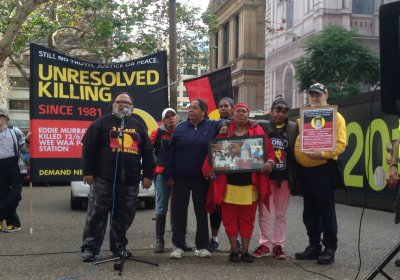Since the Obama administration arranged for the release of Sergeant Bowe Bergdahl, the last US prisoner of war held by the Taliban in Afghanistan, there has been a firestorm of outrage from the right wings of both the Republican and Democratic parties.
Bergdahl has been pilloried as a traitor. His father has been denounced as a Muslim. Senators called for him to be court-martialed and thrown into the military stockade.
What is Bergdahl’s crime? While deployed in Afghanistan, he became disillusioned with the war and said so in emails to his family.
1012
It was obvious from the start that the aims of Thailand's military junta, which seized power last month, were not about a sincere attempt to restore peace between the two opposing sides in Thailand’s political crisis.
How could it be when the military were part of those who wanted to pull down the democratic system from the start?
The military staged an earlier coup in 2006, wrote a new, less democratic constitution, and appointed half the senate and most of the members of so-called independent bodies.
An old truism says that in periods of crisis, politics speeds up.
That is being strikingly confirmed in the Spanish state after the June 2 abdication of King Juan Carlos. So too is its corollary ― that institutions that seemed solid and long-lasting suddenly look out-of-date and fragile.
About 5000 people protested outside Parliament House in Hobart on June 14 to call for the protection of Tasmania’s World Heritage forests.
The World Heritage Committee unanimously approved the extension of 120,000 hectares of new reserves to the Tasmanian Wilderness World Heritage property at a meeting in June last year. The forests were judged to have met all four natural heritage criteria.
Tender
Written & directed by Lynette Wallwarth
A new documentary film, Tender, screened at the recent Sydney Film Festival, follows residents of the Wollongong suburb of Port Kembla who are working to start a not-for-profit funeral service in their local community.
Recognising the local need for affordable and meaningful funeral services, the Port Kembla Community Centre decided to provide them. The film follows their journey as they gather community support and explore alternatives.
The 2014 European elections were the first to held since the full extent of the financial and economic crisis and its consequences became apparent, Murray Smith says.
In a May 19 article on US government spying for The Intercept, Ryan Devereaux, Glenn Greenwald and Laura Poitras publish leaked documents that show the US government may have used the Drug Enforcement Administration (DEA) to aid National Security Agency (NSA) spying on US citizens and non-citizens in foreign countries.
The leaked documents refer to “a vibrant two-way information sharing relationship” between the two intelligence agencies, implying that the DEA shares its information with the NSA to aid with non-drug-related spying.
One of the hallmarks of the neoliberal age has been the exponential expansion of commercial spectator sport — in its economic value, political role and cultural presence. All of which is thrown into high relief by the World Cup in Brazil.
In recent years, the sporting industry has grown in all regions above the local GDP rate. It is estimated to have generated US$135 billion in direct revenues last year. These revenues derive from gate receipts, corporate sponsorship, media rights and merchandising.
“The Gezi Resistance is the biggest popular uprising in modern Turkish history,” said long-time socialist activist Nuray Sancar. “It smashed the fear we have been living with since the military coup in 1980.”
It has now been a year since the Gezi Resistance started with a handful of people protecting trees in Gezi Park in Istanbul's Taksim Square in June last year. Protests spread to 79 cities across Turkey in the next few months.
Big business and mining giants are the acknowledged big winners of the recent federal budget, and it is Aboriginal people who will be the hardest hit.
The transformation of the Australian health and education systems as well as the cuts to welfare proposed by the federal budget will have particularly bad effects on Aboriginal people: whether living in remote communities, in cities or regional centres.
Australia is at risk of becoming a scientific backwater due to the federal government’s budget cuts to the CSIRO.
The government has proposed a $111 million cut to CSIRO funding in the May budget — about 20% of its total funding — and at least 1000 full-time staff will lose their jobs over the next four years.
Eight CSIRO sites around the country will close. Many are in regional country towns, which rely on the sites for employment.
Over 100 people rallied in Sydney on the anniversary of Eddie Murray’s death in police custody in a northwestern New South Wales town of Wee Waa 33 years ago.
Murray's murder was one of the black deaths in custody that led to the historic Royal Commission into Aboriginal Deaths in Custody.
- Page 1
- Next page








